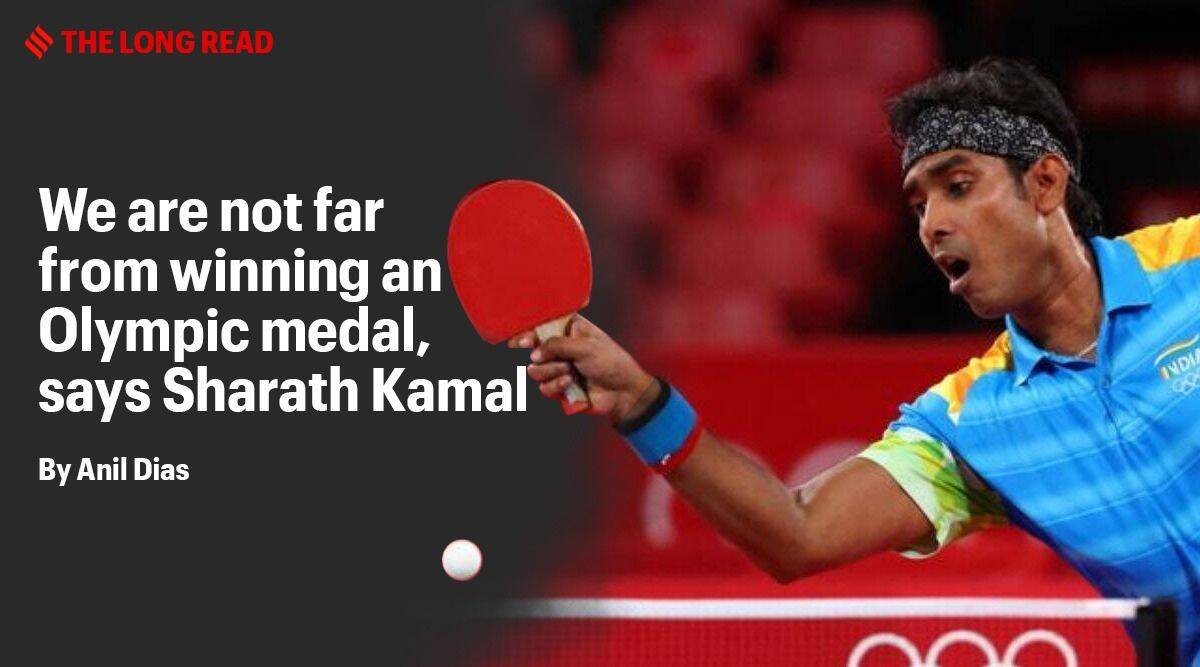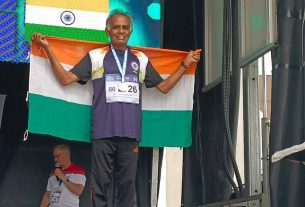TT star Sharath Kamal in conversation with Anil Dias where he talks about how he made tweaks to his game, like a stronger backhand to complement his forehead and his dreams of a team medal in 2024.
Thank you for reading this post, don't forget to subscribe!Shared News: August 14, 2022 5:06:17 pm
Sharath Kamal won the gold medal in men’s singles in the recently concluded Commonwealth Games.
Three gold medals and a silver in his kitty made this the most successful Commonwealth Games for the evergreen table tennis star Sharath Kamal, who at 40 is willing to step out of his comfort zone and adapt. The senior pro talks about how he made tweaks to his game, like a stronger backhand to complement his forehead, his dreams of a team medal in 2024 and why he believes a paddler from the country will win an individual medal at the Olympics within a decade
How do you do what you do? How have you managed to be at the top of your sport for so long?
That comes through lots of practice and understanding the process over time. I’m able to understand what my body requires, what my mind requires, and what it takes to be in the best shape. This is not just my effort. It’s a complete effort with my coaches – mental coach, physical coach, and nutritionist.
They tell me, at this stage, we’ll be doing this or that. These are the tournaments we’ll be playing. It’s a long-drawn process where planning and organisation are quite important aspects. When we stick to the plan, the results come in.
Over the years you have played opponents with different styles. Table tennis has changed a lot too. How have you managed to adapt?
Without adaptability, you don’t have longevity. You need to keep adapting to new techniques, new technology, and new knowledge. You need to constantly keep updating yourself so that you are in the race with all of your competitors. That’s one thing I’ve been able to keep up with. Be the change in the ball from a 38mm diameter to 40mm (in 2000), a change in the rubber or change in techniques. I was able to keep up with the changes and adapt.
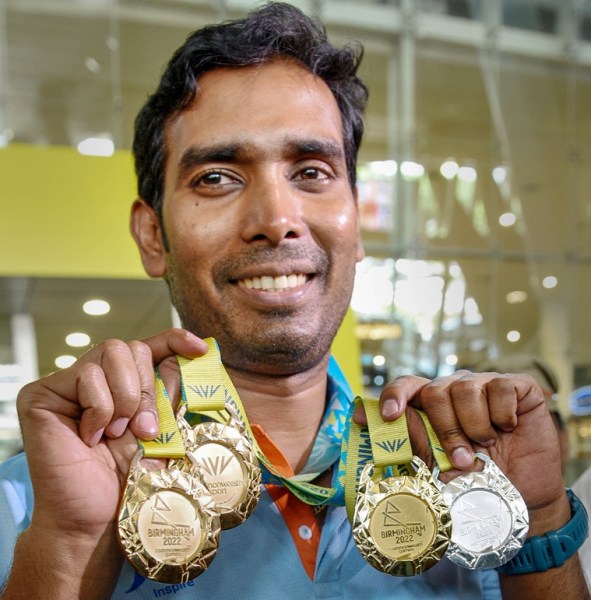
Commonwealth Games (CWG) gold medallist and table tennis player Sharath Kamal poses for photographs upon arrival at Chennai International Airport, in Chennai. (PTI)
What were the most testing aspects of the game you’ve had to change and adapt to?
The game patterns have changed. The scoring has changed and that’s been the most difficult change. Apart from that, the service rule has changed, the size of the ball has changed, the material of the ball has changed and the equipment has changed.
Earlier the ball used to travel very fast and then the ball became a bit heavy. Until 2008, we could use speed glue on our bats (speed glue increases the elasticity of the racket, which adds speed and spin to the ball). They banned it immediately after the 2008 Olympics. The season had already started and we didn’t have time to adapt. These may seem small changes, but they’re not
And you adapted to everything without complaining…
I learned very early on in my career that I’ll have to adapt. My coaches helped too. They taught me not to complain about stuff and pushed me out of my comfort zone. Back then, infrastructure was very bad. I learned never to complain about those things so I think that’s helping me adapt to new things and basically go out of my comfort zone.
How do you prepare yourself for each match and has anything changed in all these years?
We analyse all the matches and we sit down and talk about it. That’s how we build a practice session. If there’s something we are not doing well we practice that and if there’s something we are doing well, we sharpen that. We are constantly evolving.
Viswanathan Anand recently spoke about how he keeps up with the younger generation in chess. He said it isn’t something that happened overnight and he has made small tweaks over time that helps him compete. Do you think that’s the same for you?
It’s a lot more physical for me (laughs). If I can keep up physically, then I can keep up technically. That’s something which I have learnt, especially after the period where I kept losing to the youngsters between 2011 to 2015.
The thing is that they already started off with the new technology and I had to change and adapt to the new and I fell behind. So in that sense, I had to completely upgrade myself. There were not minor tweaks, there were major things.
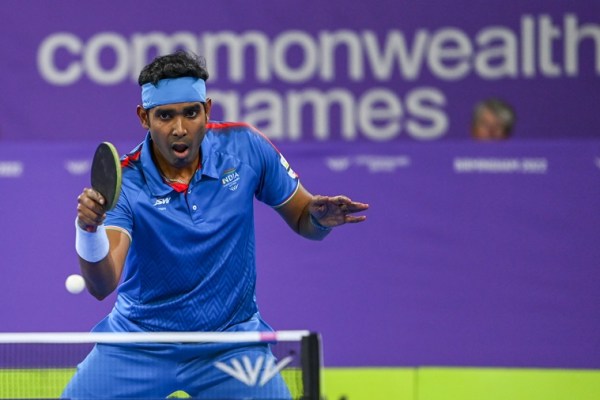
Sharath Kamal Achanta of India plays a backhand return to Liam Pitchford of England in the men’s singles table tennis gold medal match at the Commonwealth Games. (AP)
Major things like?
Well, the backhand technique. Let’s say till 2010 I used to play only forehand, my entire game used to be forehand based. Though it is still more forehand based, backhand is now an integral part of my game. It took me a while to work on the coordination between backhand and forehand.
You said you kept losing to players between 2011 to 2015. How did you bounce back from that? You also had a major injury in 2015 which set you back by six months…
Things started to work out because in those four years I was trying to adapt. The injury also slowed down the process but by 2017 I was back on track.
Coming to Indian table tennis, how far do you think we are from winning an Olympic medal?
We are not far from winning an Olympic medal but it’s not very easy either. At Paris 2024, unfortunately for me, I am looking at a team medal because that is something that is possible with me Sathiyan (Gnanasekaran) and Harmeet (Desai).
What about singles for you?
Singles are very far-fetched for me. I’m not in the top 10 of the world to think of an Olympic singles medal. Also, I’m 40 so it will be physically demanding. I need to keep up physically to be the best in the business. I do have to work a lot more on the physical aspect and some technical aspects also need to be worked on.
But within eight years from now, I can say that India could stand a chance of winning a singles medal at the Olympics.
There’s always a question of who after you in men’s table tennis. Right now it seems to be Sathiyan. Do you think Sathiyan or any of the current top players can ever reach your level?
Sathiyan has already reached the level that I am playing and in fact, I am catching up with him. He is doing extremely well in international tournaments, raising the bar and I’m just trying to keep up with the rankings
You’ve obviously interacted with a lot of Indian players. Have you seen a spark in anyone?
Lots of Indian players have a spark. A lot of players have been doing well at the junior level and they are highly ranked in their category too. They need the confidence that they can be the best in the world. We always had good talent in the junior category. It is just that in the transition from junior to senior, it gets lost.
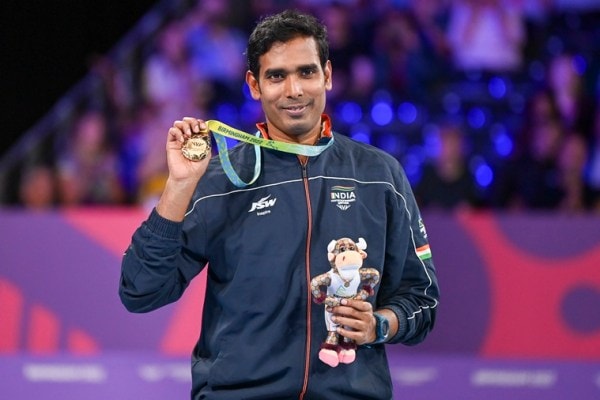
Sharath Kamal of India holds up his gold medal after defeating Liam Pitchford of England in the men’s singles table tennis final at the Commonwealth Games (AP)
Table tennis is slowly improving in the country and hopefully, in the near future, there will be a setup to produce new champions one by one. It can’t be just a one-off that someone is coming out and playing well.
Manika Batra was asked to tank a match before the Tokyo Olympics. What is your take on having to tank matches in order for your compatriot to make the cut for a major multi-sport event?
I cannot comment on that because someone asked her to do it and not me. Post that, there have been a lot of complications. I try to keep away from it and focus on the game at hand
How would you define yourself and your career?
I can’t ask for anything better. At 40, I’m still peaking. I don’t think anybody has done that across any sport. I am really happy to be in the spot where I am.
What’s next for you?
The main focus is the Paris Olympic games. But we do have World Championships coming up and a few other tournaments. First, let us bask in this glory and then get back to the drawing board.

